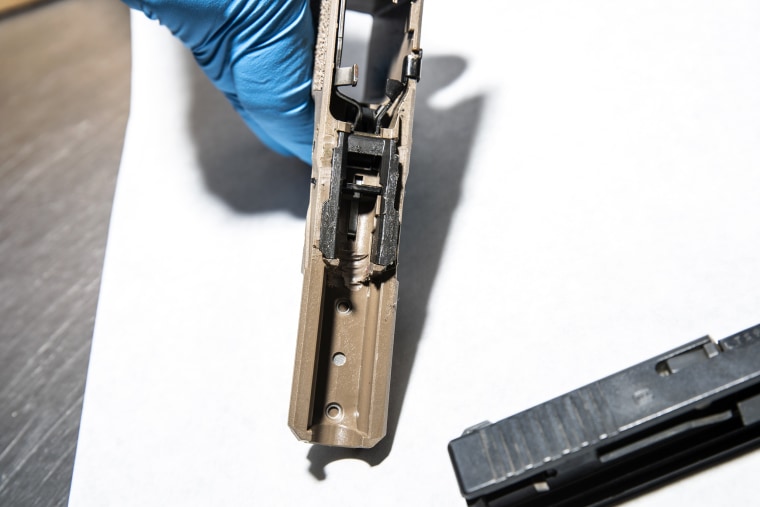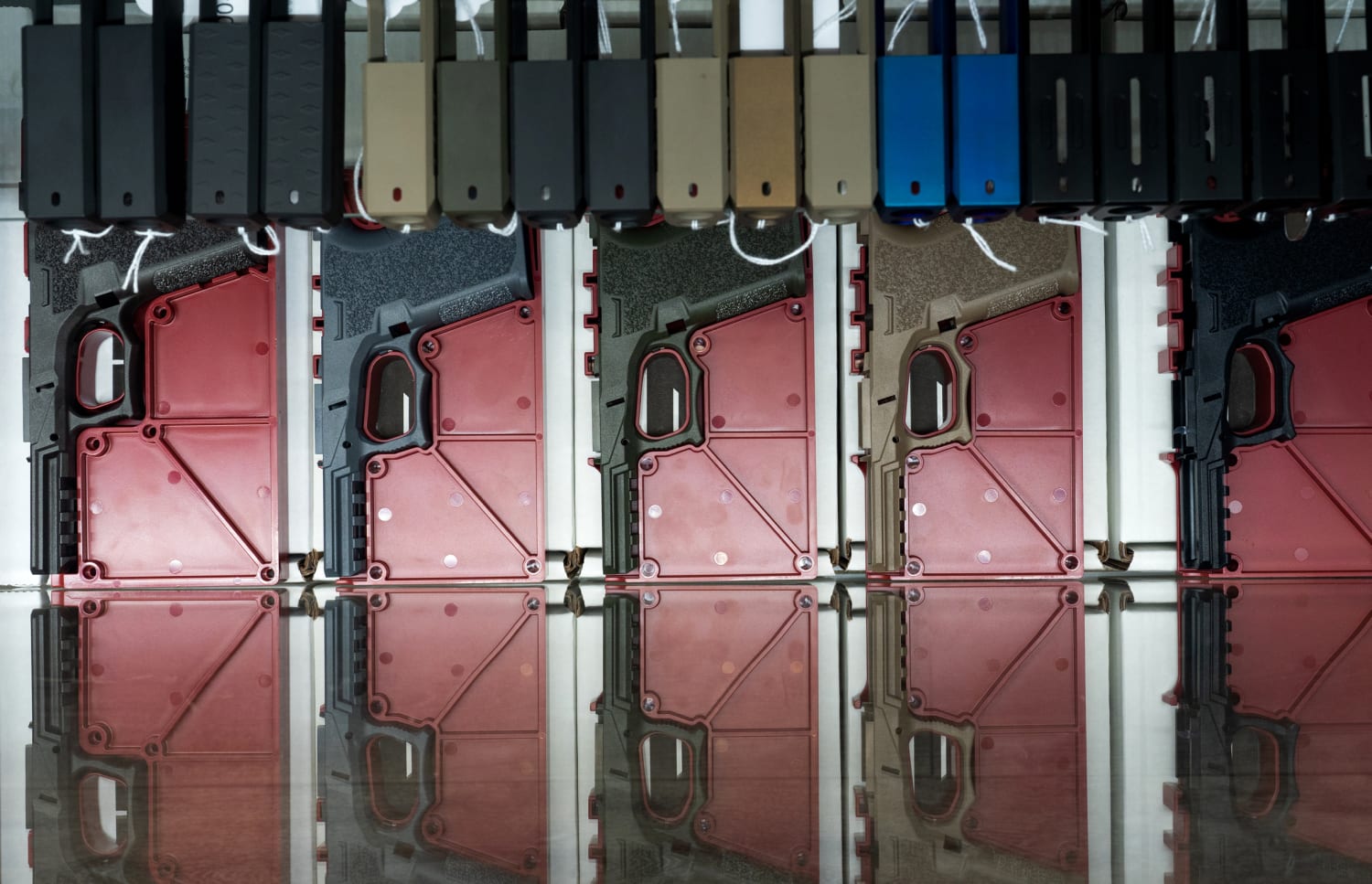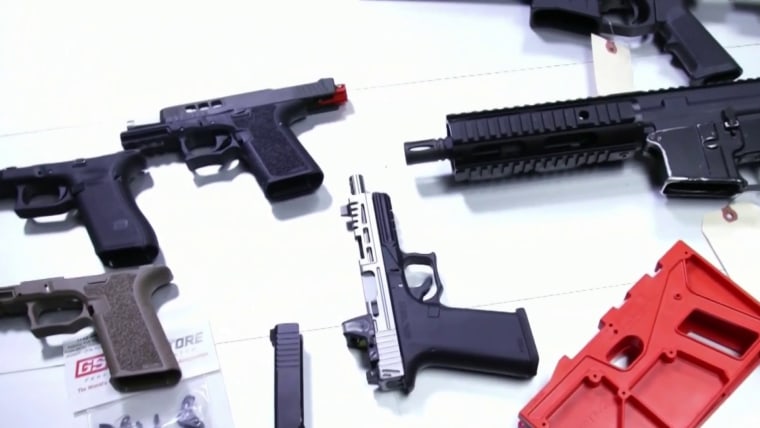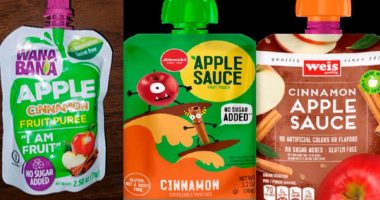On a Saturday evening in the fall of 2020, Los Angeles County Sheriff’s Deputy Claudia Apolinar and her partner parked their police cruiser in downtown Compton with plans to keep watch over a Metro train stop. Suddenly, Apolinar heard gunshots from the passenger side of the car. Then came a warm, searing pain.
Apolinar tried to radio for help, but one of the bullets had sliced her tongue apart. Her partner, Deputy Emmanuel Perez-Perez, tried to open the passenger door to confront the shooter. But his arm was hit, and he couldn’t use his right hand.
The September 2020 ambush, detailed in a civil suit filed last year, left Apolinar and Perez-Perez with serious injuries. Three days later, police arrested the man they say carried out the attack, Deonte Murray, in connection with an unrelated carjacking. Authorities found a “ghost gun” — a firearm built from a kit anyone can buy without a background check — that they say Murray used to shoot Apolinar and Perez-Perez. (Murray pleaded not guilty to all charges in both the shooting and the carjacking. He is being held on a $6.1 million bond pending trial.)
It’s unclear from court filings how Murray got the gun. The difficulty of tracing where ghost guns come from is part of what makes them so appealing to criminals — and so concerning to law enforcement. But one thing was clear: the “P80” logo stamped at the base of its grip.
Los Angeles has been a hot spot for ghost guns, experts say. Last year, the Los Angeles Police Department recovered 8,661 firearms. Of those, 1,921 — or more than 22 percent — were ghost guns.
And, according to data from the LAPD included in a recent court filing, 1,722 of those ghost guns — almost 90 percent — were made from kits produced by a single company: Polymer80.
Nevada-based Polymer80 is one of the largest manufacturers of do-it-yourself ghost gun kits in the country. But that success has also put the company in the crosshairs. Apolinar and Perez-Perez sued the company last year. Their suit — which alleges Polymer80 acted negligently and violated firearms laws — follows cases brought by the city of Los Angeles and by Washington, D.C., which also accuse the company of disregarding state and federal gun laws.
In December 2020, agents with the federal Bureau of Alcohol, Tobacco, Firearms and Explosives searched the company’s headquarters in Dayton, Nevada. The government alleged in its search warrant affidavit that Polymer80 was selling firearms without performing mandatory background checks, marking weapons with serial numbers or maintaining the required records, among other violations.
A spokesperson for ATF declined to comment on the status of any investigation into Polymer80.
A lawyer for Polymer80 said after the raid that it was cooperating with the investigation.
Reached by phone, Polymer80’s president, Loran L. Kelley Jr., emphasized that the company hasn’t been charged with any crime and disputed ATF’s allegations that the company’s ghost gun kits qualify as firearms that are regulated under federal law. He declined to comment on the pending civil lawsuits, citing advice from the company’s attorneys.
“Polymer80 is a law-abiding company,” he said. “Always has been. We’ve always been aboveboard.”
He added, “It’s a legitimate company catering to a sector of the market that has nothing to do with a criminal element.”
A legal gray zone
Like all companies that sell ghost gun kits, Polymer80 exists in a legal gray zone.
For many modern firearms, only the lower part of the weapon — called the “frame,” the “lower” or the “receiver” — is legally considered a firearm. And under federal law and ATF regulations, it’s a firearm only once it’s past a certain point in the manufacturing process.
For years, companies have been selling unfinished metal lowers for AR-15-style rifles that buyers could complete at home with machining tools. Because they were only 80 percent complete, the unfinished parts weren’t considered firearms, so they didn’t require background checks in most states.
One of the earliest into the market was Polymer80. In 2014, Kelley incorporated Polymer80 with his late father, Loran L. Kelley Sr., and their business partner, David L. Borges, who retired last year. (Borges directed a request for comment to Polymer80.)
The company was one of several that started selling AR-15-style lowers made of a plasticlike material called a polymer, along with a jig and drill bits that made it easier to make working rifles with common power tools.
Within a few years, Polymer80 expanded to sell unfinished polymer frames for Glock-style handguns, along with the jigs and drill bits used to finish them. It also began to offer what it called “Buy Build Shoot” kits, which included all the parts needed to turn an unfinished lower or frame into a working gun — sometimes in an hour or less.

The company voluntarily sought approval from ATF to sell several models of unfinished “lowers” from 2015 to 2017, according to an ATF search warrant affidavit. Twice, ATF responded that its designs didn’t meet the definition of a firearm, clearing them to be sold without federal restrictions.
But in 2018, the bureau balked at making a determination about whether another lower should be considered a firearm because Polymer80 didn’t include the additional parts sold with the kits in its application for review, the affidavit shows. This did not preclude Polymer80 from selling the kits.
As the popularity of Polymer80 and other ghost guns grew, some state and local law enforcement officials started calling for stronger federal regulations. National data on ghost guns are incomplete, at best. ATF estimates that police recovered 10,000 privately made firearms in 2019. The weapons, which come from multiple manufacturers, have been linked to a growing number of crimes across the country, including mass shootings, attacks on police and drug and gang killings.
But during the Trump administration, calls to strengthen federal regulations failed.
Still, ATF was investigating Polymer80. In its application for a search warrant ahead of the December 2020 raid on Polymer80’s headquarters, ATF wrote that the way Polymer80 marketed and sold its unfinished lowers with jigs and drill bits, along with the other parts necessary to turn them into working guns, made them firearms under federal law. That triggered a host of legal requirements that Polymer80 failed to meet, according to ATF — including adding serial numbers to the lowers and performing background checks on its customers.
Kelley disagrees with ATF’s assertion that the company’s kits are firearms under federal law.
“Polymer80 doesn’t break the law,” he said. “We’ve actually never sent unserialized firearms to anyone. That’s an allegation the ATF has made based on a premise for an investigation that obviously we’re maintaining is false.”
The legal argument over what constitutes a firearm may soon become moot. The Biden administration last year proposed a federal rule that would regulate the sale of homemade gun kits like all other firearms, requiring buyers to pass background checks and forcing manufacturers to add serial numbers to the parts. The rule is still pending.
Laws and lawsuits
As state and local authorities have waited for federal regulation, some have taken steps to regulate the sale of ghost guns.
In 2016, then-California Gov. Jerry Brown signed a law that didn’t outlaw ghost gun kits but required anyone making a homemade firearm to have it serialized and to pass a background check — drawing the ire of gun advocates, including the Firearms Policy Coalition.
Eight states followed with their own laws, according to the Giffords Law Center to Prevent Gun Violence, including Hawaii, New Jersey, New York and Washington.
Several cities, especially in California, also took action. The Los Angeles City Council passed an ordinance in November that bans the possession, sale or purchase of guns or major gun parts that don’t have serial numbers. The measure followed on the heels of similar bans in San Francisco and San Diego in September that went a step beyond the 2016 California law.
California passed an additional requirement in 2019 that will mandate background checks to buy the major parts used to make ghost guns, along with the previous serial number requirement. The law is set to go into effect this year.
Polymer80 has pushed back against some restrictions. The company is seeking to intervene in a lawsuit brought against ATF by parents of children who died in a ghost gun shooting at Saugus High School in Santa Clarita, California, in 2019. (The case has been stayed pending release of ATF’s final ghost gun rule.) And the company successfully sued to overturn part of a ghost gun ban in its home state, Nevada.
It also hired Mark Barnes & Associates, a boutique law firm in Washington, D.C., in August 2020 to lobby federal decision-makers in its behalf, according to federal lobbying disclosures — although Barnes’ lobbying reports have revealed little actual lobbying for Polymer80 so far.
The lawsuit brought by Apolinar and Perez-Perez, the Los Angeles County deputies shot with a Polymer80 ghost gun in September 2020, is moving through the court system. Their lawyers declined to comment. Meanwhile, a separate lawsuit brought by the city, filed in February 2021, claims that Polymer80’s sales practices “make a mockery of federal and state background check laws.”
In an interview, City Attorney Mike Feuer said the city’s goal is to stop the flow of ghost guns into Los Angeles by blocking Polymer80 from selling its products in California, alleging that they they violate existing firearms regulations. (Polymer80 has denied that it is breaking the state law.)
“It’s too late when a crime is committed using a ghost gun,” Feuer said. “There’s been a victim at that point. I want to prevent those crimes in the first place by working to cut off the supply.”
Like many other major cities, Los Angeles has seen a marked increase in violence over the past two years. The Los Angeles Police Department reported 397 homicides last year, up from 355 in 2020 and 258 in 2019. Shootings rose from 1,337 in 2020 to 1,499 last year. The Los Angeles Police Department declined to comment, and the Los Angeles County Sheriff’s Department did not respond to requests for comment.
Some advocates and experts say the rise of ghost guns has made firearms more available, which can lead to more violence. Ben Owens, a violence intervention expert in Los Angeles who runs the nonprofit Detours Mentoring Group, said a lot of his day-to-day work, especially after shootings have already occurred, involves rumor control — keeping accusations from flying that can result in more shootings.
“The availability of guns definitely increases retaliation opportunities,” he said.
Still, gun industry and Second Amendment advocates say more regulations on ghost guns won’t necessarily lead to less crime. Lawrence Keane, a senior vice president and general counsel at the National Shooting Sports Foundation, which represents the firearms industry, said California’s 2016 law requiring people to register privately made firearms with the state hasn’t stopped the surge in ghost gun shootings. He said a better approach would be to provide more resources for police, prosecute more cases and issue stiffer sentences.
“Don’t defund the police, don’t have ‘no bail’ policies, and don’t have soft-on-crime policies,” he said.
Keane also expressed concerns about the pending federal rule that would more tightly regulate ghost guns, which he said could put a burden on the industry and could overstep ATF’s statutory authority.
“There are a lot of laws in place — you know, background checks, et cetera — which the industry supports,” he said. “Yet criminals still find ways to illegally obtain firearms.”
Source: | This article originally belongs to Nbcnews.com











